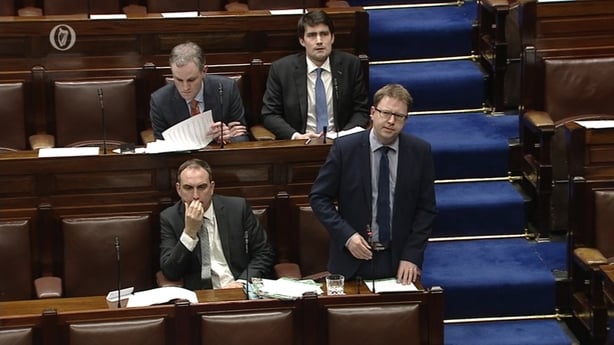A senior executive from Google has said the company supports a proposed bill to achieve greater transparency in political advertising online, but raised concerns about how it would work.
Lee Dunn, Google's Head of International Elections Outreach, was addressing the Oireachtas Communications Committee today, which is currently scrutinising the Online Advertising and Social Media Transparency Bill.
The bill was proposed by Fianna Fáil TD James Lawless who said it aims to achieve transparency in paid political advertising and tackle the deliberate usage of multiple fake accounts for political purposes, known as bots.
"While fully supporting the bill's objective to enhance transparency in online political advertising, we believe that the legislation must also strike a careful balance with the rights of free expression, access to information, data protection, and privacy," Ms Dunn said.
Ms Dunn said that Google was concerned that part of the bill would have the unintended consequence of placing online platforms "in the position of being arbiters of matters of political speech in Ireland, by placing on them the onus of identifying whether an ad is directed towards a 'political end'".
Mr Lawless told the committee that he sought to strike the right balance between regulation and respecting free speech.

He added that the bill did not set out to censor or silence anybody. "It merely sets out to have disclosure and transparency about who is posting what and who is sponsoring it," he told the committee.
Ms Dunn said the company noted that this bill is not intended as a comprehensive reform of Irish political advertising laws.
"As such it does not address the current ambiguity in the law around regulation of foreign actors seeking to deliver advertising in Irish political campaigns - something which has been of significant public concern recently," her statement to the committee read.
Meanwhile, a senior civil servant at the Department of Communications also addressed the committee today, describing the areas covered by the bill as "profoundly sensitive and complex".
Principal Officer Richard Brown told the committee that there were two questions relating to enforcement that needed to be considered. The first related to the complexity associated with dealing with what amounts to the regulation of content online.
"This is by its nature a highly subjective matter, and one which would likely give rise to some profound challenges in constructing a legal instrument that would facilitate successful prosecutions in this space," Mr Brown said.
He also said the committee would need to consider "some of the questions that arise around a Minister having powers to essentially police a form of online political activity, including the safeguards to ensure that such powers are used appropriately".
The Secretary General of the National Union of Journalists Seamus Dooley told the committee that the union supported the regulation of advertising.
"We especially recognise the need for regulation in respect of electoral, political and public affairs. There is a clear public interest in ensuring that advertising is not disguised as news. That rule applies across the board," Mr Dooley told the committee.
He also told the committee that there is a wider issue of whether there is a need for an electoral commission within Ireland "to look at all aspects of elections".
Google's Public Policy Manger Ryan Meade said the company had contributed to the Electoral Commission in the UK on the same subject.
"That's an example of where it's useful to have a standing body that can actually consider these matters. Similarly one of the views we have expressed on the bill in question is who would enforce it?," Mr Meade asked the committee.
He added that there was "definitely an argument" that a standing body would help achieve some of the aims of the bill.







